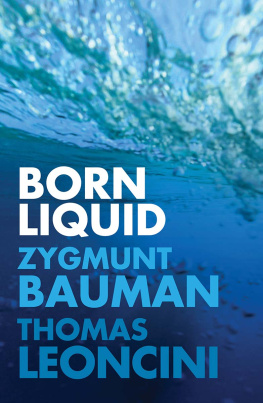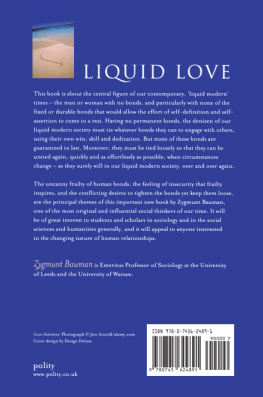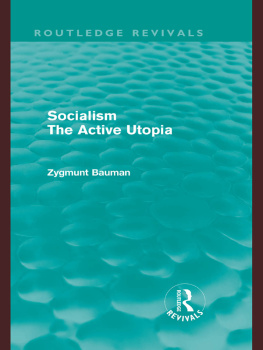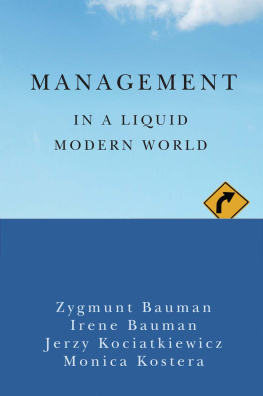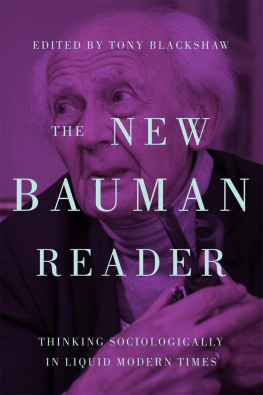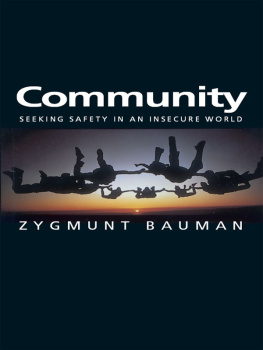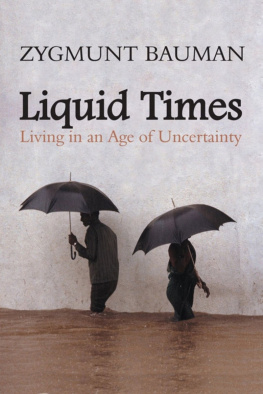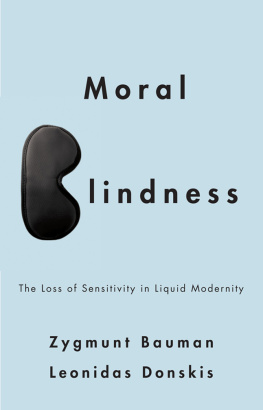Contents
Guide
Pages

To Zygmunt, to whom I owe everything.
To Aleksandra, Lydia, Anna,
Irena, Maurice and Mark:
I am so grateful that life made our paths cross.
THOMAS LEONCINI
Born Liquid
Transformations in the Third Millennium
Passages from the Italian translated by Lucinda Byatt
Zygmunt Bauman
Thomas Leoncini
polity
First published in Italian as Nati liquidi. Trasformazioni nel terzo millennio Sperling & Kupfer Editori S.p.A, 2017
This English edition Polity Press, 2019
The right of Lucinda Byatt to be identified as translator of the Italian passages in this work has been asserted in accordance with Section 77 of the Copyright, Designs and Patents Act 1988.
Polity Press
65 Bridge Street
Cambridge CB2 1UR, UK
Polity Press
101 Station Landing
Suite 300
Medford, MA 02155, USA
All rights reserved. Except for the quotation of short passages for the purpose of criticism and review, no part of this publication may be reproduced, stored in a retrieval system or transmitted, in any form or by any means, electronic, mechanical, photocopying, recording or otherwise, without the prior permission of the publisher.
ISBN-13: 978-1-5095-3070-0
A catalogue record for this book is available from the British Library.
Library of Congress Cataloging-in-Publication Data
Names: Bauman, Zygmunt, 1925-2017, author. | Leoncini, Thomas, 1985- author.
Title: Born liquid : transformations in the third millennium / Zygmunt Bauman, Thomas Leoncini.
Other titles: Nati liquidi. English
Description: Cambridge, UK ; Medford, MA : Polity Press, [2018] | Includes bibliographical references and index.
Identifiers: LCCN 2018012971 (print) | LCCN 2018029270 (ebook) | ISBN 9781509530700 (Epub) | ISBN 9781509530670 (hardback) | ISBN 9781509530687 (pbk.)
Subjects: LCSH: Postmodernism--Social aspects. | Social change--Philosophy. | Civilization, Modern--21st century. | Social history--21st century.
Classification: LCC HM449 (ebook) | LCC HM449 .B39513 2018 (print) | DDC 909.83--dc23
LC record available at https://lccn.loc.gov/2018012971
The publisher has used its best endeavours to ensure that the URLs for external websites referred to in this book are correct and active at the time of going to press. However, the publisher has no responsibility for the websites and can make no guarantee that a site will remain live or that the content is or will remain appropriate.
Every effort has been made to trace all copyright holders, but if any have been inadvertently overlooked the publisher will be pleased to include any necessary credits in any subsequent reprint or edition.
For further information on Polity, visit our website: politybooks.com
On 21 February 2017, an international seminar held at the Kolegium Artes Liberales of the University of Warsaw, Poland, was held to celebrate Zygmunt Baumans theory of liquid modernity. I was asked to talk about my husbands last works and I began by describing the joint project with a young man to write about the younger generations, those who are Born Liquid. I told the audience about how they corresponded and how the young man was committed to finishing the book after Zygmunts departure into liquid eternity. The lecture hall was packed to overflowing, and an even wider audience was listening online, linked from various parts of the world. There was enormous interest. I believe there could not be a better augury for the long voyage undertaken by this little book.
ALEKSANDRA KANIA BAUMAN
With the demise of my individual body, bodily existence will not really end. It will continue, much as it started before the appearance of my body and before the beginning of my own thinking, before my entering the world. It will continue in the form of the bodily presence of other people.
ZYGMUNT BAUMAN, Mortality, Immortality and other Life Strategies
Zygmunt Bauman,
Mortality, Immortality and other Life Strategies, Cambridge: Polity, 1992, p. 18.
Skin-deep transformations
Tattoos, plastic surgery, hipsters
Thomas Leoncini:
Young people are a snapshot of the changing times. It is impossible not to love them and hate them simultaneously. They are what we love most about our past, but also what we instinctively detest, because it didnt last forever; it was fluid, liquid. Today, when we analyse what being young means, we are victims of a failed cultural relativism one that is impossible to put into practice efficiently, simply because it doesnt exist outside ourselves, an us that looks on at the doorway of the ego. As we look at the young, we look with the gaze of liquefied persons who have inevitably altered their own boundaries: we are the product of whatever lifes circumstances have made us. The product of that us that today is no longer part of our present and can therefore do nothing except see itself in other peoples faces. If its true that the mind travels using cultural schemas created by our brains in order to respond rapidly to any situational event (this is what cognitive psychology says), it is equally true that often our struggle to tolerate the young is also motivated by the regret that we didnt make the best of, understand or fully observe our earlier life before we unconsciously found ourselves in the current one.
So, when we look at a young boy, perhaps of school-leaving age or thereabouts, we no longer see him using the frame of mind that we had when we were his age, but rather using our completely liquefied schemas ones that belong to different people, people who are now others compared to what we were then.
Put in even simpler terms: to us, the traits shown by the young, so replete with the present, are unrecognizable, whether as the individual offspring of our desire for self-affirmation, or in terms of aesthetic fashion, that reality which is often undervalued but essential because it pervades and invades our gaze.
Appearance is for me that which lives and is effective, wrote Nietzsche, and, in this, the young represent the mass change par excellence of styles and interests linked to the present, which anthropologists have realized is the most important element of their borderline science, by definition incomplete and unrealized in its fragmented entirety, to the extent that it transforms anthropology from biological and palaeoanthropological physics into cultural and social anthropology. And the young are the most representative examples of what we will become, today and tomorrow. Even Aristotle defined mankind as incomplete.
But the desire for completion (while undoubtedly vain and illusory) has been present since the dawn of civilization. So what could be better than our body as the stage on which to enact a presentation of self? The aesthetic sense, it should be remembered, is partly subjective and objective, but, above all, also cultural and collective.
We often talk about the aesthetic phenomenon as the most representative fashion of the modern age, but fashions are anthropopoietic that is to say, they form part of the knowing construction of being human. From the earliest times, humans have refused to leave their bodies as they are and they have always been determined to alter them, based, to varying degree, on the dominant culture. Even washing ourselves every morning is nothing more than a representation of the relationship humans have with their bodies, the need to change it vis--vis the natural run of things: in this respect, the English anthropologist Mary Douglas stated that hygiene is not just a question of scientific progress.

